Trump reveals the 100 executive orders he plans to implement on his return to the White House
Donald Trump confirmed during a meeting with Senate Republicans that his immediate priorities are border security and rebuilding US energy production through 100 executive orders.
The president-elect plans to announce at least 25 of these orders on the first day of his second term in the White House.
On Wednesday, Trump gave the Senate Republican caucus a look at his first agenda items and how he plans to get them done at a meeting in Washington.
“Border czar” Tom Homan and top immigration adviser Stephen Miller attended the meeting as Trump laid out how his mass deportation program will get off the ground.
The president-elect said he will declare a national emergency to mobilize everything in the fight against the migrant crisis.
Announcing the deportation of every illegal migrant with a criminal record is at the top of his list.
Homan said the plan calls for the military to carry out deportations, although they will not arrest people.
Axios reported that Trump would reportedly aggressively use laws on the books to provide more aid to Immigration and Customs Enforcement (ICE) and would continue building his border wall.
Donald Trump confirmed during a meeting with Senate Republicans that his immediate priorities are border security and rebuilding US energy production through 100 executive orders.
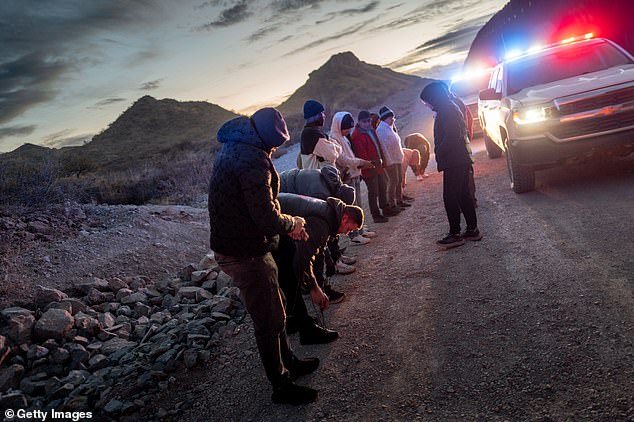
The president-elect said he will declare a national emergency to mobilize everything in the fight against the migrant crisis
Trump also said he needed help from Congress to approve funding for detention centers to provide at least 100,000 beds for those affected.
With a slim margin in Congress and several Republican attempts to thwart some of Trump’s more expensive priorities, this could prove difficult for House Speaker Mike Johnson.
Trump also appears poised to bring back travel bans on what he calls “terror-ridden countries.” New York Post reported.
Other border policies Trump plans to implement early on include reinstating the “Remain in Mexico” rule, ending migrant flights from the border, ending catch-and-release and no longer allowing in migrants to America via the CBP One app.
He will also try to end so-called “birthright citizenship,” which makes children born on U.S. soil to illegal immigrants no longer citizens.
Trump’s other big priority will be undoing many of the Biden administration’s clean energy policies, including a return to offshore gas and oil drilling, as well as the Arctic National Wildlife Reserve in Alaska as part of Trump’s infamous calls to ‘drill, baby, drill’. the campaign trail.
He will also end Biden’s electric vehicle mandate, which could potentially hurt DOGE co-chairman and “First Buddy” Elon Musk. Trump will also end Biden’s ban on natural gas exports.
As long suspected, Trump will issue blanket pardons to supporters arrested during the Capitol riot on January 6, 2021, and will fire Special Prosecutor Jack Smith.
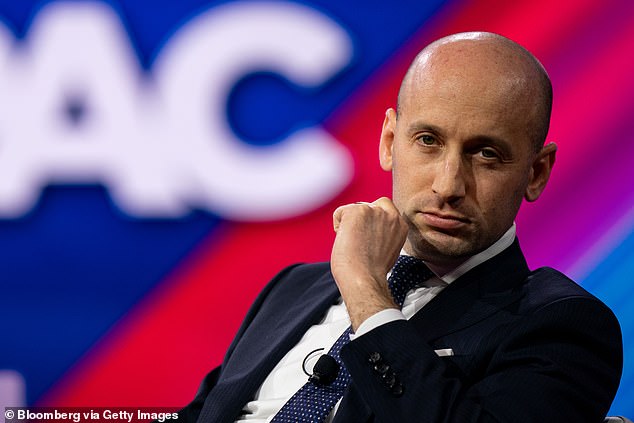
‘Border czar’ Tom Homan and top immigration adviser Stephen Miller (pictured) attended the meeting as Trump outlined how his mass deportation program will get off the ground
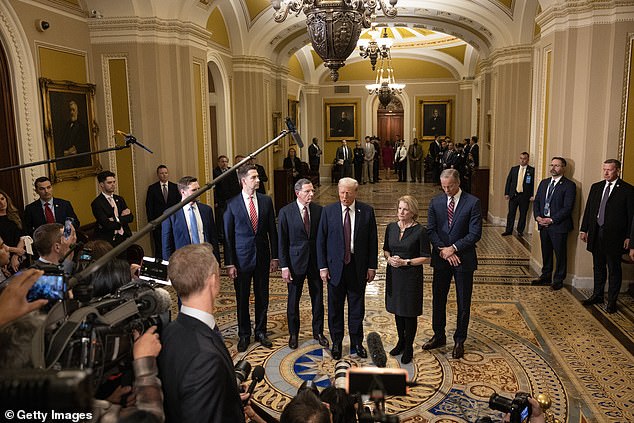
Donald Trump met with Senate Republicans on Wednesday to outline his agenda
He will also end Biden’s attempt to redefine sex as “gender identity” under Title IX.
Trump and Republicans in Congress have been discussing how to implement the president-elect’s agenda once he returns to power.
The 78-year-old president-elect teased in a social media post Monday that he wants the legislation to include a range of his priorities, including border security and extending the tax cuts he introduced in 2017.
‘“We must secure our borders, unleash American energy, and renew Trump’s tax cuts, which were the largest in history, but we will make them even better,” he wrote.
‘NO TAX ON TIPS. IT WILL ALL COMPOSE TARIFFS, AND MUCH MORE, FROM COUNTRIES THAT HAVE TAKEN BENEFIT FROM THE US FOR YEARS,” he continued.
The “no tax on tips” provision was a promise he made during the campaign.
The president-elect will begin his second term in the White House on January 20, after the Republican Party-controlled 119th Congress convened on Friday.
But Republicans have very little room for error in their rowdy conference as they set out to advance Trump’s agenda.
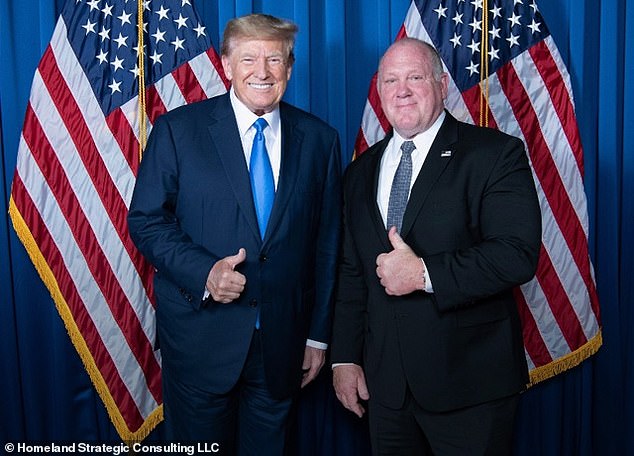
Donald Trump and ‘border czar’ Tom Homan want a lot to be passed on day one so they can solve the problems at the border
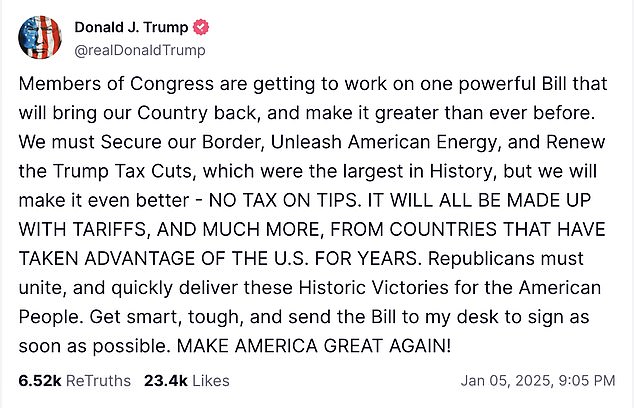
They have only a three-seat majority in the Senate and will temporarily have a virtually non-existent majority in the House of Representatives once the president-elect takes office.
“Republicans must unite and quickly achieve these historic victories for the American people. Be smart and tough and get this bill to my desk ASAP for signing,” Trump wrote on Truth Social.
Trump and Republican Party leaders want to pass their legislation using the shaky so-called budget reconciliation process.
It would allow them to pass a bill with a simple majority in both chambers and avoid the usual 60 votes in the Senate needed to avoid a filibuster.
But some Republican lawmakers also see a lone major bill as Republicans’ best chance to pass priorities by such a narrow margin in the House of Representatives.
The first glimpse of how challenging it will be for the Republican Party to overcome the power struggle came Friday with the re-election of House Speaker Mike Johnson.
He could only afford to lose one vote and be elected chairman as the Democrats remained united in opposition. Two Republican lawmakers had to reverse their votes to secure his victory after initially voting against him.
Republicans had considered two separate budget reconciliation bills last month after scoring victories in both chambers.
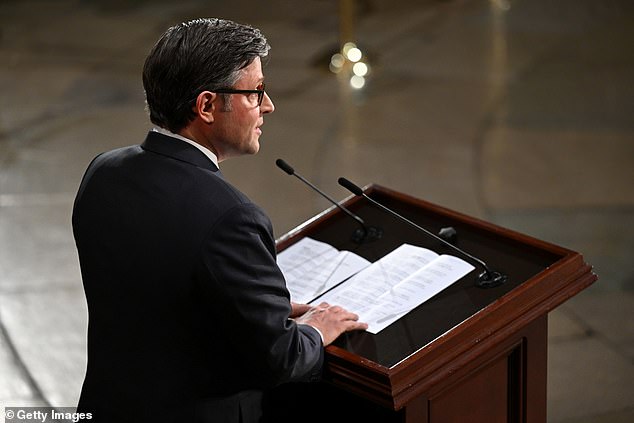
Trump and Republicans in Congress, such as House Speaker Mike Johnson, have mapped out how they will implement the president-elect’s agenda once he returns to power.
Conservative Republicans, at the behest of the House Freedom Caucus chairman, sent a letter to congressional leadership in mid-December demanding that the first priority be a reconciliation bill that focuses on border security.
They argued that the second reconciliation bill should focus on addressing the expiring tax cuts from the tax law passed in 2017 under President Trump. Several provisions of that law will expire in early 2026.
But some Republicans in recent weeks have questioned the idea of introducing two separate massive bills in one year.
While Trump said he wanted one big bill, he left the door open for two on Monday.
‘Although I am in favor of one bill, I do that too I want to get everything approved, and you know, there are people who don’t necessarily agree with it,” Trump told conservative talk show host Hugh Hewitt.
House Republicans met in Maryland Saturday morning to discuss their path forward and boost efforts with Johnson signaling Trump’s preference for one piece of legislation.
Johnson also laid out the expected timeline this weekend. He said they aim to move forward with the reconciliation process in early February, but the entire effort could take several months.
Some Republican lawmakers have indicated that the passage of any government spending must be offset by other cuts as the U.S. faces a rising national debt.
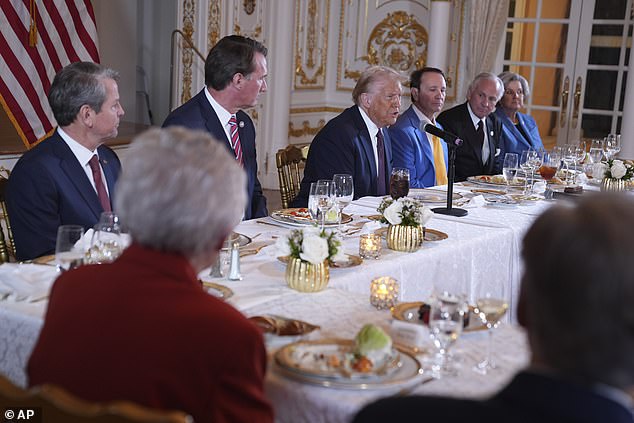
Trump and Republican Party leaders want to pass their legislation using the shaky so-called budget reconciliation process
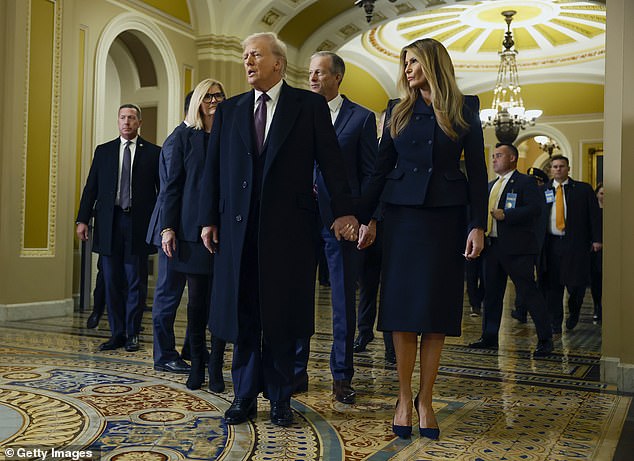
Melania Trump stood by husband Donald’s side as he met with the Republican titans in the Senate
The battle between Republicans in Congress could easily come down to what exactly they are willing to give up to implement their agenda, if they can even achieve compensation that some are likely to demand.
A key to the whole process is the increasing pressure Congress faces to raise the debt limit to prevent the government from defaulting on its bills.
While Republicans raised the debt limit three times during Trump’s first term, some conservative lawmakers have signaled they are unwilling to support the Republican Party’s action on the debt limit unless deep cuts occur.
Trump’s message about using tariffs to pay for ending the tip tax could also spark intraparty conflict.
During the campaign season, some Senate Republicans, including new Senate Majority Leader John Thune, objected to Trump’s widespread plan to impose tariffs.
They warned of retaliatory tariffs that could be imposed on U.S. products in response, as economists also signal that the costs of the tariffs would be passed on to U.S. consumers.
The use of reconciliation to pass legislation has been used with some frequency in recent years as political divisions have eroded bipartisanship in Congress.
President Biden and Democrats used the budget reconciliation process to pass the American Rescue Plan in 2021 and the Inflation Reduction Act in 2022.
However, when they attempted to include immigration reform provisions to include legal residency for millions of immigrants in the reconciliation process, this attempt was rejected in late 2021 by the Senate parliamentarian, the impartial arbiter of Senate rules.
